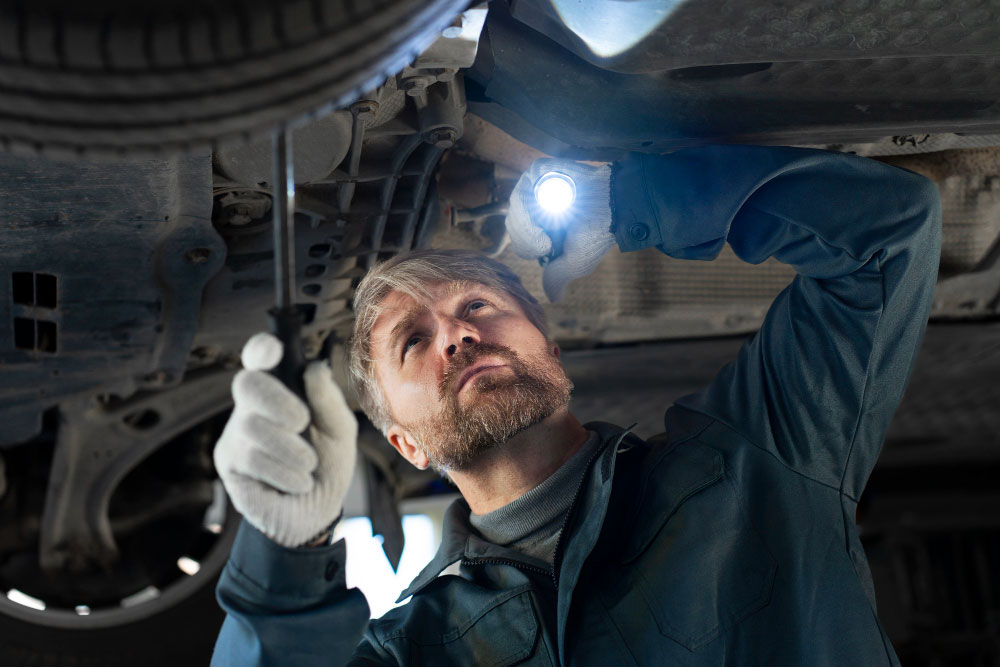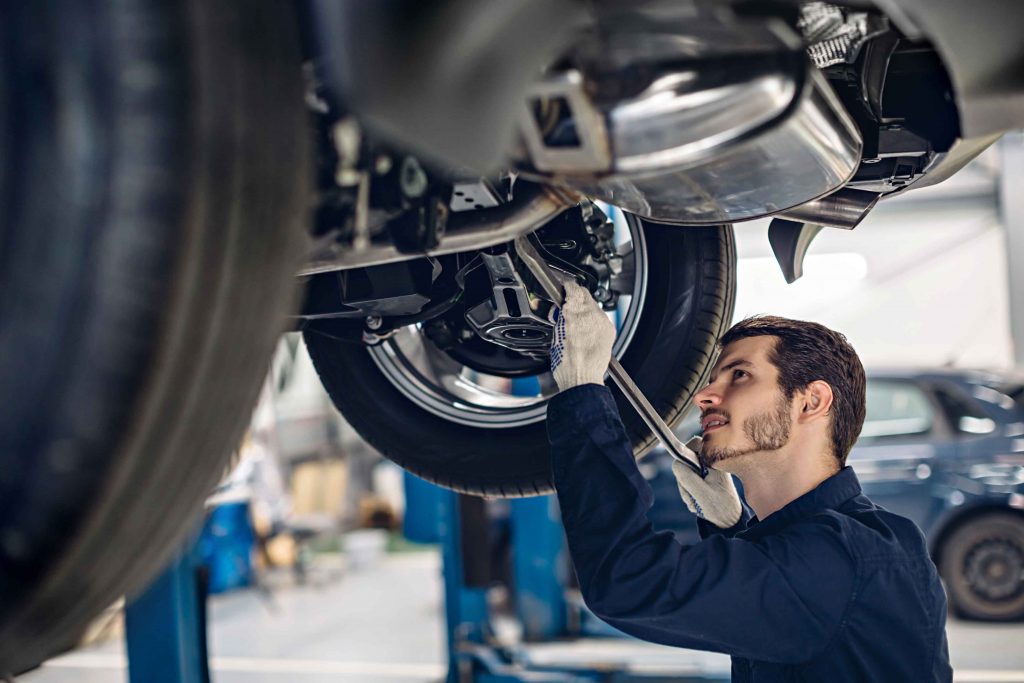By using CAQ software, Daimler’s Düsseldorf factory has made its screwing processes even safer – screw connections of A and B categories according to VDI 2862 are regularly tested.
Quality at the Düsseldorf factory, Daimler has been making automotive history for over 50 years. It is one of the most modern factories in the world and serves as the central manufacturing facility for vans – more than 3.5 million vans have already been produced here. Since 1994, the Sprinter has been manufactured in Düsseldorf. The primary goal for the 6,600 employees at the factory is to produce vehicles of the highest quality, with optimal performance and cost efficiency. The latest comfort and safety technology is used for this purpose.
With the introduction of QS-Torque software in August 2012, coinciding with the factory’s 50th anniversary, quality assurance in Sprinter production was enhanced and elevated to a new level. The central CAQ solution from CSP GmbH & Co. KG enables the reliable assessment of component connections. Measurement data from processes, machines, and tools can be statistically evaluated with QS-Torque. The focus at the Düsseldorf Daimler factory is particularly on screw connections. The decision to choose QS-Torque was easy for those responsible, as the solution was already a standard in many Daimler factories for securing component connections. A reference visit to the passenger car factory in Sindelfingen convinced the Düsseldorf project team of the software’s performance and capabilities. Just like in other industrial companies, Daimler must meet very high standards, not only due to its own quality requirements.
Industry-wide guidelines must, of course, also be followed and reliably documented. This includes, in particular, a VDI guideline for the automotive industry that defines the requirements for screw connections. The VDI 2862 guideline divides screw cases in vehicle manufacturing into three risk classes and defines the minimum specifications for the screw system used in each case. Risk class A includes all safety-critical screw connections, the failure of which could pose a danger to life – such as if a wheel falls off.
Risk class B includes function-critical screws. If these are not properly tightened, the vehicle could break down – but without danger to the passengers. Category C includes less critical screw connections that, if they fail, would only result in customer dissatisfaction but would not affect the vehicle’s functionality.
Remaining Torque Within Tolerance Limits? At the Düsseldorf Daimler factory, QS-Torque secures safety categories A and B. The factory operates 24/7 in a three-shift system, with 700 vans rolling off the production line each day. Sampling checks of the screw connections are carried out very closely: For a defined number of vehicles per shift, the screw connections are checked depending on the tools used, with QS-Torque. During this check, it is determined whether the measured remaining torque is within the defined tolerance limits. The values are carefully set based on complex calculations of 50 individual values. Among other things, the fact that certain components and materials, such as sheets and coatings, behave differently during screwing is taken into account. The testing equipment used is high-quality electronic torque wrenches.
To check the quality of the screw connections, the screw cases are first compiled and structured in route plans. For example, screw connections on the front and rear axles of a vehicle are distinguished. The screw cases for the respective measurement range are always updated in the central QS-Torque database and loaded onto the electronic tool. For each vehicle to be tested, the respective vehicle number is scanned as a barcode from the fender, and the corresponding actual and target values are stored. Along the line, the tester works through the screw cases and uploads the results of the screw connections back to QS-Torque. The goal is to achieve “OK” values, visualized by a green light symbol. If a screw connection is not “OK,” the case is reported to a supervisor, and the components must be re-tightened or screws adjusted. Furthermore, the issue must be investigated: Was the non-conforming screw connection an isolated case? Or does it occur more frequently? In such cases, quality assurance staff must research whether, for example, paint or oil is affecting the screwing process.
With the curve module of the software, users can also graphically evaluate and analyze all curve data measured from a screw connection and stored during individual process checks. This makes the entire screwing process highly transparent. Should any general problems or trends emerge in the process, appropriate measures can be taken quickly.
Proof for Audits & Co. An additional benefit of QS-Torque: The software can also provide proof of a stable process during audits, as it reliably documents and centrally stores all measurement data. For example, if a process is checked, the correct screwing can be proven at the push of a button. QS-Torque manages all master data required for process testing and storing test results. With additional modules, master data from other systems can also be imported into the software’s database.
The software supports various tasks in quality assurance at the Düsseldorf factory, from planning to test management. More than 110 employees at the Düsseldorf factory work with the software. Assembly planners, for instance, input the latest screw cases into the system. Testers then load this data from the software onto their electronic keys and upload the screw case data. Even supplementary notes for non-conforming values, such as “slipped,” are recorded by testers in QS-Torque. Test equipment managers enter data for sampling tests, including test data, serial numbers, and more. They also analyze the screw curves. Quality control colleagues are also supported by QS-Torque. They generate weekly reports from the database, covering measures, curve analyses, and test quality.
Line-Runners Check 200 Screw Cases per Shift After its introduction in 2012 and corresponding training, a pilot phase began in which group leaders took over the sampling checks of the screw cases per shift. In summer 2013, a concept with line runners was implemented. As a result, only one employee per shift and a backup are needed to test the screw connections. Additionally, these specialized employees become more experienced with using the torque wrenches and analyzing the data, and they are not under time pressure. Each line runner checks about 200 screw cases per shift.
Michael Kostka, Assembly Planner at Daimler Düsseldorf, assesses the collaboration with CSP for the introduction of QS-Torque very positively: “For any questions or problems, the specialists for process data and component connections were able to help quickly. Our employees were trained with the software. Overall, QS-Torque has made the screwing process in van production even safer. Based on the positive experiences, additional factories in the commercial vehicle segment have now also been equipped with the solution.”
Since then, CSP has installed QS-Torque in all Daimler passenger car and van factories worldwide. At some locations, such as the Bremen factory, the software has already been in use for over twelve years. Over the years, more factories have been added, including a factory in Beijing, which has been securing component connections with QS-Torque since November 2012.
User Profile Daimler, Düsseldorf Factory: Quality under the Star: At the Düsseldorf factory, more than 700 vans are produced daily in a three-shift system. The beginning of automotive production at the site dates back to 1950, when cars were still produced here. Since 1962, production has focused on vans. All closed models for Europe and North America are built here. A new Sprinter model with outstanding features, such as side wind assist and brake distance warning, has just been announced. With approximately 6,600 employees and 200 apprentices, the factory is the second-largest industrial employer in the Rhine metropolis. The factory covers a total area of 688,000 square meters – equivalent to about 1,100 football fields.



